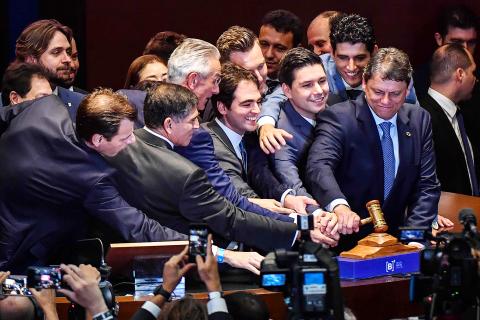Spain’s Aena snapped up six airports in Brazil on Friday, in an auction seen as the first major test of foreign investor confidence in Brazilian President Jair Bolsonaro’s market-friendly agenda.
The initial sale of concessions to 12 airports generated 2.3 billion reais (US$620 million) — more than 10 times the minimum fee required — which Bolsonaro said signaled that “confidence” in Latin America’s biggest economy was returning.
“It’s Brazil growing again!” he tweeted, hailing a “great victory.”

Photo: AFP
Rights to operate the airports for 30 years — sold in three separate lots — were also won by Flughafen Zurich of Switzerland and Aeroeste, a Brazilian consortium.
Nine groups competed. The administrators must invest 3.5 billion reais during the term of the concession.
Brazil is to complete the sale of concessions to 42 airports from next year to 2022, including Santos Dumont in Rio de Janeiro and Congonhas in Sao Paulo. The airports auctioned on Friday represent 9.5 percent of the domestic market.
Six airports in northeastern Brazil were bought by Aena, two in the center-west went to Flughafen Zurich and four in the southeast went to Aeroeste.
Aena’s successful tender included the auction’s most lucrative prize, tourist-magnet Recife airport, a destination seen as having the biggest potential because of its relative proximity to Europe.
Brazilian Minister of Infrastructure Tarcisio Freitas said that the auction was “a great demonstration of confidence in the country.”
Former Brazilian president Michel Temer initiated a program of privatizations and concessions, but Bolsonaro, who took over from Temer in January, has made privatizing state-owned companies and overhauling the costly pension system key planks of his policy to reduce soaring public debt and regain investor confidence.
The auction, organized by the Brazilian National Agency for Civil Aviation and the Sao Paulo stock exchange, was also seen as a test of the market’s support for Brazilian Minister of Economic Affairs Paulo Guedes, a US-trained free-marketeer.
Guedes is spearheading the Brazilian government’s policy to inject pro-business vigor into an economy still bearing the scars of a record-breaking recession in 2015 and 2016.
Separately, Brazil and the US could work together to build small nuclear reactors, Brazilian Minister of Mines and Energy Bento Albuquerque told reporters on Friday, adding that the South American nation is also ready to open uranium mining to foreigners.
Brazil is preparing legislation that would clear the way for private and foreign investment in prospecting and mining for uranium in the country, Albuquerque said in an interview.
There is a draft of the legislation, but a final version must be negotiated with the Brazilian Congress, he said.
“We have to resolve internally the issue of uranium exploration that today is a monopoly of the state and is in the hands of Nuclear Industries of Brazil,” Albuquerque said, referring to the state firm running the country’s uranium mines.
“What we have to do is to make our legislation more flexible so that there can be private uranium exploration,” he said.
Albuquerque is in Washington ahead of Bolsonaro’s first official visit to the US since he took office.
Additional reporting by Reuters

Quanta Computer Inc (廣達) chairman Barry Lam (林百里) is expected to share his views about the artificial intelligence (AI) industry’s prospects during his speech at the company’s 37th anniversary ceremony, as AI servers have become a new growth engine for the equipment manufacturing service provider. Lam’s speech is much anticipated, as Quanta has risen as one of the world’s major AI server suppliers. The company reported a 30 percent year-on-year growth in consolidated revenue to NT$1.41 trillion (US$43.35 billion) last year, thanks to fast-growing demand for servers, especially those with AI capabilities. The company told investors in November last year that

Intel Corp has named Tasha Chuang (莊蓓瑜) to lead Intel Taiwan in a bid to reinforce relations between the company and its Taiwanese partners. The appointment of Chuang as general manager for Intel Taiwan takes effect on Thursday, the firm said in a statement yesterday. Chuang is to lead her team in Taiwan to pursue product development and sales growth in an effort to reinforce the company’s ties with its partners and clients, Intel said. Chuang was previously in charge of managing Intel’s ties with leading Taiwanese PC brand Asustek Computer Inc (華碩), which included helping Asustek strengthen its global businesses, the company

Taiwanese suppliers to Taiwan Semiconductor Manufacturing Co. (TSMC, 台積電) are expected to follow the contract chipmaker’s step to invest in the US, but their relocation may be seven to eight years away, Minister of Economic Affairs J.W. Kuo (郭智輝) said yesterday. When asked by opposition Chinese Nationalist Party (KMT) Legislator Niu Hsu-ting (牛煦庭) in the legislature about growing concerns that TSMC’s huge investments in the US will prompt its suppliers to follow suit, Kuo said based on the chipmaker’s current limited production volume, it is unlikely to lead its supply chain to go there for now. “Unless TSMC completes its planned six

TikTok abounds with viral videos accusing prestigious brands of secretly manufacturing luxury goods in China so they can be sold at cut prices. However, while these “revelations” are spurious, behind them lurks a well-oiled machine for selling counterfeit goods that is making the most of the confusion surrounding trade tariffs. Chinese content creators who portray themselves as workers or subcontractors in the luxury goods business claim that Beijing has lifted confidentiality clauses on local subcontractors as a way to respond to the huge hike in customs duties imposed on China by US President Donald Trump. They say this Chinese decision, of which Agence